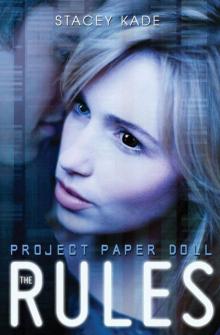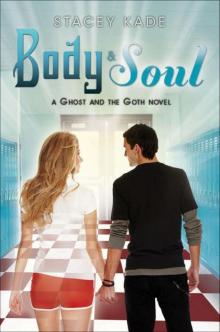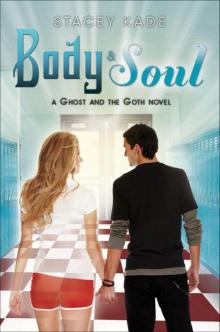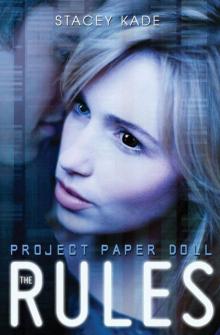- Home
- Stacey Kade
Project Paper Doll Page 8
Project Paper Doll Read online
Page 8
They—whoever they were—had risen above their primal instincts to achieve something amazing.
And as soon as they’d gotten here, however many thousands of light-years away, the human part of my heritage had shot them down, out of fear or hate or both.
Inspiring, right?
But it was important for me to remember that in this particular situation, as with most, giving in to my human side would be dangerous. Satisfying maybe, but dangerous. I wanted, raged, and needed, just like everybody else. But my analytical nonhuman side knew that giving in was risky; it might lead to decisions that would put my life or freedom in jeopardy. I wasn’t above taking risks, but they had to make sense beyond the emotional appeal. Emotions were all too often what tripped the full-blooded humans up. They wanted something more than was practical or reasonable. The desire to feel a connection with another person, to actively love or hate someone—chasing after those things left you open and vulnerable.
Logic was sound, and it had saved me countless times.
Except once, my human side shouted. Remember that?
In the lab, that last night, it had been a gut instinct, the desire to survive at any cost, that had overruled the whisper of logic, encouraging me to come out from behind my cot at the urging of the guard, the man who would become my father.
I shook my head. That was different. In that case, it had been a matter of life and death.
It had been the middle of the night when the bomb went off. Not that I’d recognized it as such at the time. I’d found out later that people protesting against genetic experimentation on defenseless animals had sent GTX a package bomb. It had exploded in the mail-processing room, only one floor above my living quarters.
But all I knew then was that one moment I’d been asleep, and the next I was on the floor in the smoke-filled darkness, cowering behind my tipped-over cot while the walls shook and the ceiling rumbled. I wasn’t even sure if I’d crawled there or I’d simply been dumped out by whatever force had rocked the room. Sirens shrieked overhead, hurting my ears, but I couldn’t lift my hands up to cover them. My right arm ached in a familiar way that likely meant a break, and I clutched it tight against my chest.
The emergency lights flickered, trying and failing to alleviate the gloom. But I could see enough to recognize blood soaking through the white sleeves of my uniform. There were small cuts on my hands, and probably more on my arms. The games and books on my shelf had been shaken to the floor. Shiny bits of glass lay spread across the room, sparkling like diamonds in the unsteady light. And beyond that, the window wall, the one that occasionally masqueraded as solid, was fractured irreparably. A giant crack dominated the smooth surface, zigzagging into thousands of smaller breaks. At the bottom, the glass was gone entirely, fissures giving way to a gaping hole with sharp and jagged edges. The observation room, where Dr. Jacobs and the techs had watched me, was dark and somehow looked smaller than normal, filled with unfamiliar shapes. I realized that was because all the equipment had been thrown into a jumble at the center of the room and the walls appeared to be sagging. Wires were smoking and snapping.
It took me a second to gather the implications of the facts at hand: I was alone, unwatched, with an avenue for escape.
Immediately, the two opposing forces within me took up sides.
Run.
It could be a test, a trap.
Or it might not be. Run!
The latter voice was so loud in my head, I was up and on my feet, scurrying toward the broken window wall on shaky legs before I even realized it.
But the argument continued in my head.
You don’t know how to live Outside. It’s dangerous.
Not as dangerous as staying in here. You know what they made you do to Jerry. What do you think will happen next? Move faster!
But the problem was, no matter how loudly that voice yelled in my head or how quickly I moved, escape was not going to be easy. To begin with, the floor of the observation room was several feet higher than that of my cell—the better to see you with, my dear.
To climb out I’d have to reach up and somehow pull myself over the sharp edges of glass in the window with a broken arm.
I was standing there in front of the window wall, evaluating my options—remove the rest of the glass; no, you don’t have time for that—when a shadow moved within the observation room.
Instinct drove me to hide. I skittered back behind my overturned cot and hunched down.
I peered cautiously around the edge as Mark Tucker appeared, shoving his way through the collapsed equipment in the observation room.
He wasn’t my father then, of course. But I recognized him even with the dust in his hair and soot lining his face. He was the new guard, the different one.
Guards patrolled in pairs on a regular schedule on the other side of the glass wall. I’d never paid much attention to them because they didn’t seem to notice me no matter what (screaming, pleading, bleeding) was going on right in front of them. I now know it was because they were hired for their discretion and paid well to ensure it.
But one day, not long after the…incident with Jerry, I was sitting in the corner of my room, refusing to watch a training video. How to assemble and disassemble an M16, if I remember correctly. I’d had my back to the video and was staring out through the glass wall. Dr. Jacobs was on the other side, casually threatening me, which I ignored. Passive resistance was the only defense left to me at that point.
When the guards came through to report in to Dr. Jacobs, I noticed something different. The guard closest to the glass wall…he was doing something curious.
After checking to make sure Dr. Jacobs was involved in their discussion, I edged forward from the corner for a better look.
Though the man was focused on Dr. Jacobs, answering the questions asked of him, his hand, down by his side, was moving back and forth. A wave. A traditional manner of greeting when distance or situation does not permit spoken words, I knew.
I sucked in a breath and straightened up. This man was waving at me. He saw me.
Before I could respond—or remember that the proper response was to wave back—the monitors tracking my heart rate, blood pressure, and respiration began to flash brightly, attracting Dr. Jacobs’s attention.
The waving guard and his partner walked on, and Dr. Jacobs turned his attention to the monitor readouts and then me, demanding to know what had caused such a response.
I’d ignored his questions, refusing even to look at him. I would not give up this secret, knowing already “Grandpa Artie” would only turn it into an experiment. Or the means to force me into doing something I didn’t want to do.
But I’d watched more closely after that—every guard rotation, every shift coming through. What else did I have to do? But this one guard was the only one who waved. And to my shock, he did so nearly every time he came through. It wasn’t an accident, either. When Dr. Jacobs was watching closely, the guard remained as still and obedient as all the others.
Now, that guard was moving toward the broken-window wall, and me, with purpose. He reached the edge and kicked at the remaining sharp pieces surrounding the hole in the bottom half of the window. When the shards fell inward, he bent down carefully.
“Come on, I know you’re in there,” he whispered.
I jerked back, retreating farther behind my cot.
“You don’t have to be afraid.”
In my limited experience, that statement was only a sure indicator that I should be afraid. And I was. I could get nothing from his thoughts but a vague sense of frustration and worry. That alone was a little frightening. I was used to being able to “hear” the noise of human thoughts, even if I couldn’t always pick out specifics.
I heard his boots crunch on the broken glass as he shifted position. “If we’re going to get you out of here, we don’t have much time.” The urgency in his voice finally registered with me. He was truly worried. Why? Surely, if he waited long enough, more guards would arrive
to help him. He had nothing to fear.
I remained still, waiting, expecting him to call for assistance or charge in after me.
Instead he sighed. “I have a little girl, not much older than you. She’s been sick for a long time. She hates being in the hospital, being poked and prodded. I can only imagine what it must be like for you. It’s not right.”
I could feel his outrage along with his love for his daughter, mixed with weariness and worry. Given how little I’d sensed from him before, he felt very strongly about both topics: my captivity and his daughter.
“But I think I can get you outside, if you’ll trust me,” he said.
I looked up sharply. He’d said the magic word. Well, the one that was magic to me. Clutching my arm to my chest, I scooted closer to the edge of the cot and peered out at him. “Outside?”
He nodded slowly, as if sudden movement might frighten me away. “Do you want to go outside?”
That kind of direct question was usually a test. I eyed him speculatively. “Dr. Jacobs would not want me to go.”
The man didn’t wave away my words or tell me that I was wrong. Instead he just looked at me. “What do you want to do?”
That was, as far as I could remember, the first time anyone had ever asked me that question. Normally, someone was right there telling me what to do. Issuing commands over the intercom.
But this man, he was waiting at the edge of the room for my answer. He wasn’t charging in to drag me off, or shouting at me to do as I was told. He was asking me. I didn’t realize until years later why that was struck me so deeply—my father was the first one to treat me as a person.
Half fearing that this was an elaborate trick, I stood up, my insides quivering with fear and anticipation. “I want to go. Outside.”
He held out his hand for me. “Then let’s go.”
I hesitated for a moment, trying to think it through. Finally, the voice that had been shouting at me earlier kicked in. Someone will come for you sooner or later. And this one, he defied Dr. Jacobs. Just like you. GO. NOW!
And, my logical side rationalized, even if it did turn out to be a trick, I would likely be safer with him than any of the others who would come later.
So I left the safety of my tipped-over cot—my known world—to take his hand. It was the best decision I’d ever made. Except, perhaps, refusing to cooperate with Dr. Jacobs in the first place, but even that had had unforeseen consequences I still struggled with.
I was lucky that my father had chosen to associate his daughter with the small strange-looking child I’d been and taken the risk to save me. And I couldn’t repay his leap of faith by taking more unnecessary chances. Not for Jenna this morning, and definitely not with Zane. His plan, tempting though it was, involved too many variables, too many opportunities for the situation to spin out of control.
So I would have to continue on as I was.
The disappointment tasted bitter, and I tried to remember that at breakfast, only an hour ago, I’d been relieved to find that my cover remained intact.
The phone in the side pocket of my backpack buzzed suddenly, startling me. I waited for Miss Lenosi to face the whiteboard and then reached down and pulled it free, to find a half dozen new text messages from Jenna. I must have missed them with all the noise in the hall.
You’re coming, right?
I’m here. Where are you?
Where are you?!!!!!
Ariane? You promised!
I can’t believe you’d just leave me here!
And finally…
Some friend you are.
I sighed. Unfortunately for both of us, today was not our day.
IT TOOK RACHEL UNTIL LUNCH to catch up with me. In line for food, I had my back to the rest of the cafeteria, but when I felt cool fingertips on my neck, I knew who it was.
“Are you mad?” she asked in a pouty whisper.
I sighed. At least she knew me well enough to know that I wouldn’t be happy at what she’d said to Trey. But my anger at her had faded over the last few hours into a low-level simmering resentment. I probably had Ariane Tucker to thank for that little wake-up call. I wasn’t sure what I’d been thinking or if I’d been thinking at all, going to her and proposing that wacked-out plan. I was lucky she hadn’t taken me up on it. Rachel was just being Rachel; it was better to ride it out.
“Trey was being all sensitive, you know how he gets.” Ignoring the tray in my hands, Rachel slipped her arm through mine, which jostled everything, knocking my milk container over into my mashed potatoes. “I had to say something to get him to understand.”
Or she could have not kissed me in the first place. That would have worked. I still didn’t know what was up with that. If she didn’t want to have to smooth things over with Trey, she’d have been far better off keeping her mouth to herself.
She pulled my arm tighter between her breasts, and I could feel her warm, soft skin against mine, where the front of her shirt dipped low.
Did she think that would work on me?
“Come on, Zane,” she pleaded. “Don’t hold a grudge.”
“Just because Trey has C-lunch doesn’t mean he won’t hear about this,” I said, looking down at my arm held hostage.
Rachel let go of me with a sigh of disgust, confirming my suspicion that she was once again simply toying with Trey until it suited her to do otherwise.
“Two veggie burgers, please,” I said to the woman behind the counter.
“Real men eat meat, Zane,” Rachel said in a snippy, know-it-all tone.
“What do you want, Rachel?” I said, mimicking the rhythm of her speech.
She narrowed her eyes at me, suspicious that I was making fun of her. “I just wanted to find out if we’re going to have company this week. I heard you were talking to our special friend.”
“I talked to her.” I took the plate of veggie burgers from the weary-looking lunch lady and nodded my thanks.
“And?” Rachel persisted.
“She said no.” In truth, it had been more than that and less. I wasn’t quite sure what had happened. For as much as Ariane had regarded my offer with cold disdain, I’d seen how she’d looked at Rachel yesterday—white-hot electric hate. Participating in this countergame of Rachel’s should have been the easiest decision in the world for her. But she’d refused. Some of it might have been because she didn’t trust me, and I couldn’t blame her. She had no reason to, and what she’d seen us do to her friend Jenna yesterday probably hadn’t helped.
I winced at the memory of censure on Ariane’s face. She was right. Jenna hadn’t deserved it. Maybe I should have spoken up and tried to stop Rachel, but “Rachel on a mission” fits pretty much in the same category as “runaway train loaded with explosives.” Get out of the way or be counted among the dead.
“She said no?” Rachel gaped at me as if I’d spoken words she’d never heard before.
I took advantage of the momentary reprieve to pay for my lunch and head over to the table by the windows, where Matty and a few guys from the lacrosse team were already eating. Next year we’d be able to leave campus for lunch, even if it was only to go to the park across the street. But for now we were trapped, rats in the worst maze ever. The same corners, the same dead ends, the same boring cheese that had gone stale years ago. I’d enjoyed this once, hadn’t I? I’d been happy to be Rachel’s friend, pleased that I could follow in Quinn’s popular footsteps, maybe even besting him slightly. After all, Arthur Jacobs had only one granddaughter, and she was my age, my friend. Not Quinn’s. Even my dad had been pleased by that.
Now it all seemed tired and childish and not worth it.
I might have wondered when that had all changed, except I knew. To an exact date.
I’d spent years doing anything and everything that I thought might make my dad proud, including acting like a complete tool on various occasions, because, hey, that’s what he would have done, right? In doing so, I’d paid little or no attention to the one person who loved me for who I wa
s. If anything, I’d tried to keep distance between me and my mom, knowing my dad saw us as two of a kind.
It wasn’t until after she was gone that it finally clicked. I’d been worrying about failing the wrong person. Nothing I did would ever be good enough for my dad, and by relentlessly seeking his approval, I’d lost my mom’s.
Rachel followed me across the cafeteria. I could hear her heels clicking loudly a step or two behind me. People turned to see her coming, watching either with awe or great wariness as she approached.
Ignoring her and the inevitable storm to come, I set my tray down and dropped into an available chair, nodding at the guys.
“What do you mean she said no?” Rachel hissed in my ear. Instead of sitting down, she remained standing, sending out the message, consciously or not, that she was above us.
“Who said no to what?” Matty asked, his mouth full of food.
“Shut up and eat your pudding, Matty,” Rachel snapped, reaching down to shove his overloaded tray closer to him, her gold bracelets clanging against the hard tabletop.
“Coach told me I need to bulk up,” he mumbled, his face flushing.
“It does occasionally happen,” I said to Rachel. “Girls say no.” And it did, but not usually to me.
Ariane’s face, pale and accusing, flashed in my mind.
Rachel huffed impatiently. “I knew I should have sent Jonas.”
“You can’t now,” I pointed out, pleased that part of my plan had worked out, at least. “She’ll be too suspicious.”

 The Rules
The Rules The Trials
The Trials For This Life Only
For This Life Only The Ghost and the Goth
The Ghost and the Goth Finding Felicity
Finding Felicity The Hunt
The Hunt Body & Soul
Body & Soul Starlight Nights
Starlight Nights Queen of the Dead tgatg-2
Queen of the Dead tgatg-2 The Ghost and the Goth tgatg-1
The Ghost and the Goth tgatg-1 738 Days: A Novel
738 Days: A Novel The Ghost and the Goth 2 - Queen of the Dead
The Ghost and the Goth 2 - Queen of the Dead Project Paper Doll: The Trials
Project Paper Doll: The Trials Body & Soul (Ghost and the Goth Novels)
Body & Soul (Ghost and the Goth Novels) Project Paper Doll
Project Paper Doll